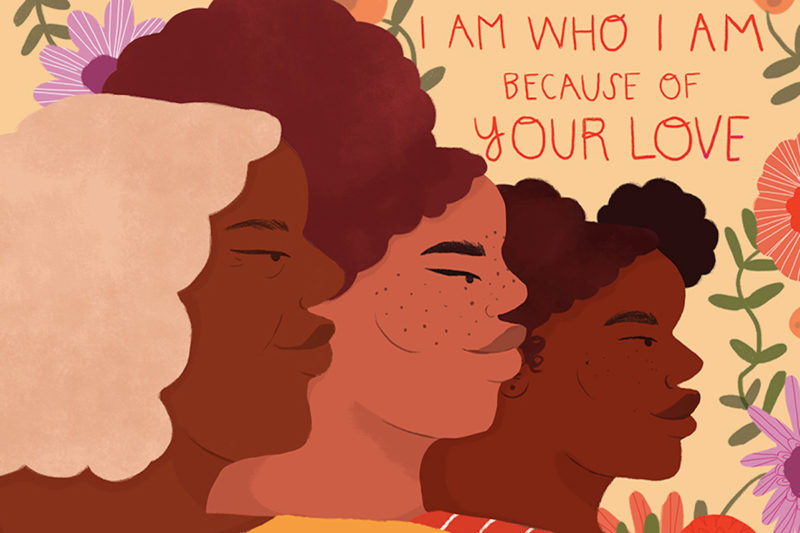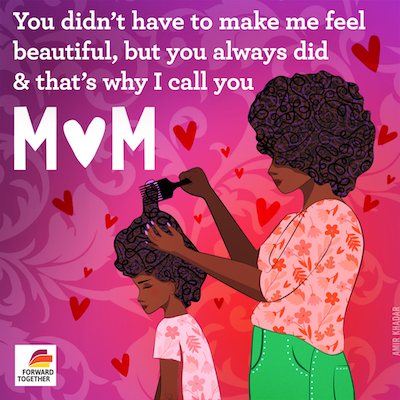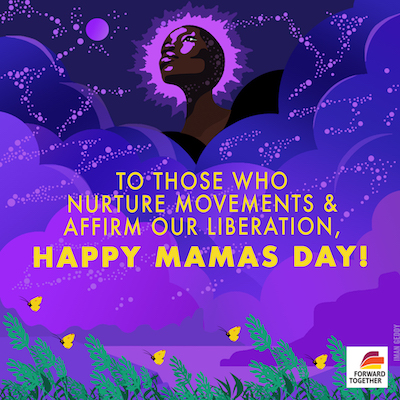Reimagining Black Mamahood in an Unjust Society
Campaigns like the Mamas Day project amplify imagery that allows Black people, including Black immigrant mothers, to see themselves as their communities see them.

One could argue that parenting, for Black women, is an act of political warfare. Women of color-led organizations have been working for decades to disrupt the toxic narrative around Black motherhood, a critical step toward dismantling the white supremacy stronghold—but it remains a steep hill to climb.
Launched this week, Forward Together’s eighth annual Mamas Day celebration is honoring Black motherhood in all its forms and the right to parent. To commemorate the celebration, artists created original card designs paired with messaging that names “what mamas need during Mamas Day and always: health care, family recognition, to live free from violence and criminalization, amongst other things,” said Diana Lugo-Martinez, the movement building director at Forward Together, a reproductive justice organization committed to Black liberation. “We’re reframing the system that’s rooted in white supremacy, anti-Black racism, misogyny, transmisogyny, xenophobia—a system that’s continuously trying to deny us our rights and our dignity.”
Since chattel slavery on stolen land, state actors have sought to control Black women’s reproduction and ability to parent in one way or another. Most recently, “the modern child welfare system … has disproportionately removed children of color from homes rather than providing support,” said Lynn Roberts, Ph.D., an assistant professor at the CUNY Graduate School of Public Health and Health Policy.
This year, Forward Together collaborated with Black Mamas Matter Alliance, the National Network of Abortion Funds, SisterSong Women of Color Reproductive Justice Collective, and the Southern Birth Justice Network “to raise the issues Black mamas are facing, with a goal of moving people to support ongoing campaigns and fights at the state, local, [and] national level that these organizations are leading,” said Lugo-Martinez. “These organizations are working to ensure that Black mamas have the right, respect, resources, and recognition to thrive.” SisterSong, for example, is leading the fight to end shackling of pregnant people who are incarcerated. “We’re asking that folks hold themselves, our communities, and systems accountable and pledge their support and show up for Black mamas and ride alongside these organizations,” Lugo-Martinez added.
Campaigns like the Mamas Day project amplify imagery that allows Black people, including Black immigrant mothers, to see themselves as their communities and their children, see them, and for non-Black people to bear witness. “It is at its heart a culture shift campaign,” Lugo-Martinez told Rewire.News.
The co-creators of the term “reproductive justice” were the first movement leaders to highlight how for women of color, the “ability to control what happens to our bodies is constantly challenged by poverty, racism, environmental degradation, sexism, homophobia, and injustice,” as Loretta Ross, co-founder and former national coordinator of SisterSong, put it in Undivided Rights: Women of Color Organize for Reproductive Justice.
As Roberts pointed out, the child welfare system offers a clear example of how Black mothers’ rights are tossed aside. In the 1990s, she directed a family rehabilitation program (FRP) in Harlem, New York, called First Steps: one of at least 20 in New York City that provided numerous services, including mental health care and in-home support, to mothers who used substances. “It was a model that worked,” Roberts told Rewire.News.
A 1999 study of the programs found that completing the program was associated with a decrease in the number of out-of-home placements of children, which are costly services, noted Roberts. Still, the program was defunded not long after former Mayor Rudolph Giuliani (R) took office.
Was it a numbers game? If so, according to Roberts, it doesn’t add up. “Does it cost more to pay for a child to be in foster care, or for someone to be in jail, or to pay for them to have a decent education and employment opportunities? When we match those dollars and cents, we know that prevention and supportive services are much more economical.”
Roberts wrote in her essay in the 2017 Radical Reproductive Justice anthology that to her knowledge, “there has not been a city initiative since FRP that centers low-income black and Latina women and their families and provided support rather than punishment for their drug use.”
Clearly, though the program ended, Roberts’ perspective hasn’t changed on its impact. “I am an adoptive parent and if I had my preferences, as much as I love my two adopted children, I would have loved to have had programs available to their moms, their birth moms, to support them in a way that they could have remained with them,” Roberts told Rewire.News in a phone interview. “I also recognize that sometimes things don’t work out, and maybe even if those services were provided, the parents might have had difficulties. But who makes those determinations, right? Everyone is very alarmed whenever there’s a child death at the hands of their parents, but we also know that some people are given more slack even when they are under the system’s watch.”
By and large, Black women in the United States have not been given leeway or dignity while birthing or parenting in the same way as other mothers. Black women have been branded as “welfare queens,” dangerous to the offspring in their wombs, and the reason for their children’s poor education and low job prospects. In the eyes of far too many people in this country, Black women can’t do right and are not “worthy” of basic human decency. This racist ideology is used as a tool against them by Republican, and some Democratic, lawmakers to slash social service rolls.
To counter that narrative, the Black Mamas campaign seeks to “paint the picture of who our families are and who our mamas are, and shift the culture for us to really begin to think about celebrating and honoring our mamas and who they are,” said Lugo-Martinez. Previous campaigns have centered other mamas organizing to fight systemic oppression, including formerly incarcerated mamas and their push to “ban the box” in 2015, and immigrant and Muslim mamas, who have been targeted under the Trump administration, in 2016 and 2017.
Amir Khadar, a multidisciplinary artist from Minnesota who created one of this year’s Mamas Day cards, explained in a phone interview that they have always looked up to their mom.
 “I started to understand a lot of her motives during our upbringing, like some of the decisions that didn’t necessarily make me too happy and how she was doing it all for our safety and our success in a lot of ways,” they said. “I’ve always really admired her strength. All the characters I draw today are in some way inspired by my mom.”
“I started to understand a lot of her motives during our upbringing, like some of the decisions that didn’t necessarily make me too happy and how she was doing it all for our safety and our success in a lot of ways,” they said. “I’ve always really admired her strength. All the characters I draw today are in some way inspired by my mom.”
In Khadar’s Mamas Day image, a mother is doing her Black child’s hair. “I wanted to depict something that was like a normal situation, a very regular situation that I’m used to experiencing—well, my mom doing my hair. It’s a very loving moment and I don’t think that it’s respected as a loving moment since the [positive] narratives that are pushed forward of motherhood are always of white mothers,” they told Rewire.News. “I think there’s so much power in them doing their hair, so I just want that to be recognized.”
Iman Geddy, an Atlanta-based artist who also created a Mamas Day card, explained on the phone that she never really understood how difficult parenting was: “You know when you’re a child, you just think that your mother is a superhero and she’s magically getting things done; you just take it for granted.”
Geddy continued, “She was working two jobs, put me through college, put my two brothers now through college as well. All the while without any social services, without any kind of safety net. It really took a toll on her and it also forced her to put her life on hold because she had to wait for all of us to get situated before she could go back to school and essentially get recertified for work that she was already doing before she came” to the United States from Somalia.
“It was a real kind of violence … that didn’t really have a language to it because the understanding is that, you know, you’re a mother, this should come naturally to you. You should be able to raise your children; you should be actually overjoyed to be able to do this thing. I’m not saying that we didn’t enjoy our lives together and we had a very—considering everything that happened—we had a very happy childhood. I’m so lucky, incredibly lucky,” Geddy said, referring to her family’s ability to leave a war-torn country and come to the United States. “But when I think about it, I’m just always so amazed and so, almost, heartbroken to think of how much easier her life would have been had there been a support system for single mothers.”
Black teen moms also experience a dearth of support services and an indiscriminate amount of stigma. “It begins by what we say about the prevention of teen pregnancy, as if this is just a known fact: that at all costs we should prevent it, as if it’s never a good thing,” said Roberts, who was a teen mom. “That alone sets someone up once they become pregnant to never feel that they are a welcome part of society. And that just trickles down through school systems, to families, from that teen parent to the child.”
Deeming a young person as unfit to be a parent is illogical when you come to understand that “the circumstances that led up to becoming a teen parent aren’t being addressed,” said Roberts, such as poverty in the family, a lack of comprehensive sex education, or childhood sexual abuse.
Teens who become pregnant deserve “every support imaginable and that’s health-care access for prenatal care and for a healthy delivery, being able to remain in school … [and] having opportunities beyond high school for college, work, employment, and child care—the same things all other parents should have, and have a right to,” said Roberts.
Roberts wanted to be clear that she refers “to not only teen parents, but also the whole idea of unplanned pregnancies, as ‘unsupported pregnancies.’” She added, “In my view, an unsupported pregnancy is one where the state, the community, and the family are unsupportive of the pregnant person.” That lack of support translates into limited or no access to quality health care, along with zero support for a decent education, employment, housing, and other social services, explained Roberts.
“Those types of opportunities and services should be readily accessible and affordable and culturally relevant,” she added. Beyond services, a supported pregnancy model would require shame-free messaging from media and the larger community, including medical practitioners and researchers, who Roberts argued should consider using the term “unsupported pregnancy” in place of “unintended pregnancy” to more accurately describe the social conditions that contribute to long-term, disparate outcomes. Meanwhile, “in the family, we’d also have to ensure [members] recognize and support young people irrespective of pregnancy.”
 Community plays an important role in the success of Black mothers of all ages. Geddy’s mom “lost her community when she left home”—as did the artist. This showed her that forming community is an intentional practice, not always a natural one. “When you come to a place and no one, absolutely no one, comes from your specific background or your tribe,” you have to expand your “sense of community and really start forging families through bonds that transcend kinship in terms of traditional kinship, in terms of blood or ethnicity.” So through her art, she would like “for people to really see themselves as not only connected to the world around them, in the general sense, but also valuable in that they always have something to offer. You always have something to offer someone and you can always learn from others.”
Community plays an important role in the success of Black mothers of all ages. Geddy’s mom “lost her community when she left home”—as did the artist. This showed her that forming community is an intentional practice, not always a natural one. “When you come to a place and no one, absolutely no one, comes from your specific background or your tribe,” you have to expand your “sense of community and really start forging families through bonds that transcend kinship in terms of traditional kinship, in terms of blood or ethnicity.” So through her art, she would like “for people to really see themselves as not only connected to the world around them, in the general sense, but also valuable in that they always have something to offer. You always have something to offer someone and you can always learn from others.”
That seems to underscore the Mamas Day campaign’s message: People should expand their way of thinking to see others as they are and maybe as more than they think themselves or others are.
When asked about the campaign’s ultimate goal, Lugo-Martinez told Rewire.News, “Now more than ever we must show up for Black mamas, because the health-care system, the immigration system, the economy were never built to benefit folks of color. It’s on all of us to fight systemic oppression. My hope is that folks will take the pledge and truly commit to fighting alongside Black mamas for health and justice.”
